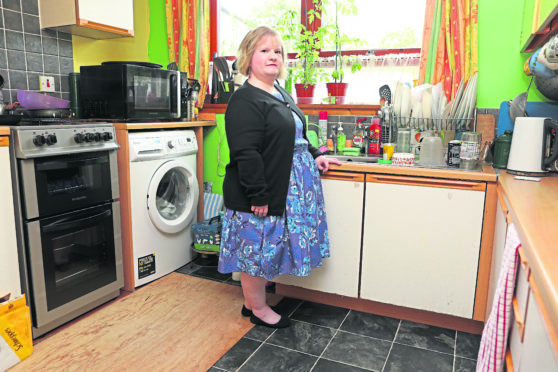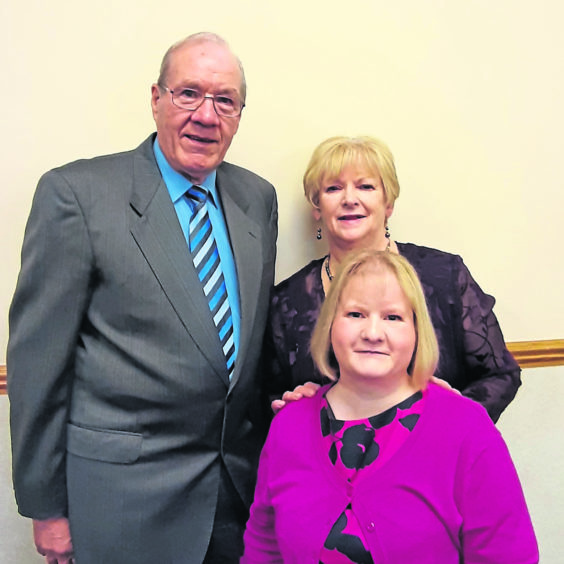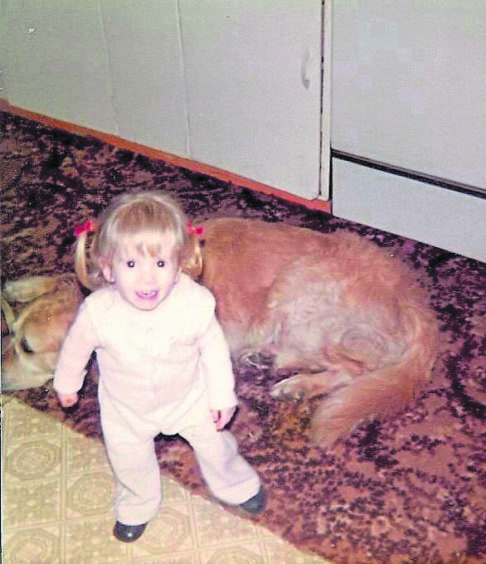Kim Taylor refers to herself as Thumbelina online and brings hope to hundreds of people who suffer from the same rare condition as she does. Here, she tells Ellie House why humour is the way forward
Kim Taylor isn’t easily embarrassed.
She prefers to confront the whispers and curious stares from children, while their
parents shush and chastise.
“Look at the peedie lady” is a common refrain, which Kim always greets with a smile and a readiness to explain.
A peedie lady she may well be, but her determination is immeasurable.
Kim has lived on Orkney her entire life and the island dialect translates as small, in
reference to her statue.
At just over four feet tall she is noticeably short and has lived with Russell Silver Syndrome since birth (RSS).
It affects one in every 50,000 people, and for the past eight years, Kim has made it her mission to locate other sufferers.
It should perhaps come as no surprise that she has managed to unite almost 300 people from around the world, who keep in touch via a Facebook page.
The group will meet up for the first time in September, and Kim hopes that by
swapping stories, those living with RSS may feel less alone.
Kim also uses social media to share her story and blogs under the name, ladythumbelina.
Here, she explains why being perceived as different has never stood in her way.
“It was assumed that I had the syndrome from birth.
“My mum was told that I was going to be small but no one knew exactly how small I would be.
“I was two weeks overdue and weighed around 2lb.
“By the time I was two years old I only weighed 10lb.
“I was seen by an specialist in Great Ormond Street, Professor James Tanner.
“He was an expert in child growth and it was confirmed that I had RSS when I was four.
“I had all the characteristics which include a curved fifth finger.
“I had elf-like features with low-set ears, it made my face look a bit like a triangle.
“I was also born with dislocated hips and a cleft palate.
“It was never a case of poor Kim though, I was never treated as a sympathy case by my family.
“My parents didn’t sit me down and tell me I had a syndrome.
“They simply said I was special.
“It wasn’t a big thing and the syndrome isn’t at the centre of my life.
“I think growing up in Orkney has given me a protective community. I’ve had it much easier than people elsewhere.
“I’ve heard of people with shorter stature getting verbal and even physical abuse.
“Or people try and take pictures, they think it’s a joke.
“Looking back, it must have been hard for my parents at times.
“I was offered experimental growth hormones which would be given by injection.
“At the time we were told that the drug could potentially give me another three inches in height.
“I was needle phobic and would have to be sedated for some of the injections, it wasn’t a quick jab.
“I know my parents thought long and hard about it.
“They asked the paediatrician; if this was your child, what would you do?
“The paediatrician said he wouldn’t give the injection.
“I’m honestly glad that it didn’t go ahead, partly because it was later revealed that the growth hormone had been infected by the CJD virus.
“So it was in fact a blessing and I’ve never resented the choice that my parents made for me.
“I’ve had major leg surgeries to try and prevent arthritis, which caused me to lose half an inch in height.
“I am in generally poor health and have a lot of mobility and joint issues.
“I was also diagnosed with heart failure three years ago.
“Doctors didn’t expect me to live.
“My parents were told that I would be made as comfortable as possible.
“I felt like I was dying but I pulled through.
“Now I’m on medication for life.
“To realise how close I came to death, I have struggled with post traumatic stress disorder as a result.
“Of course I get down days, but I’ve always used humour as a coping mechanism.
“Sometimes you have to be a bit louder to get noticed.
“My mum always said you could tell where I was because there would be a group of people laughing and having a good time.
“I’ve always been first to make the joke about my size, perhaps before anyone else can.
“Humour always gets me through and I like to address things.
“Children say what they think and I quite like that.
“They say ‘look at the peedie lady’.
“Their parents are normally embarrassed.
“I don’t mind at all and I’ve never had a problem with stopping to chat and explain.
“The main problem is that difference is
perceived as weakness.
“I’m not 5ft six, a size 10 and blonde.
“People still seem to be fascinated by what is classed as different.
“My friendship group is fantastic though, and I have known my best friend for years.
“I’ve always been quite determined to do things my way and I have lived on my own since I was 17.
“Now I live in a house which is adapted for a wheelchair user, so the majority of things are at the right height.
“Little things that you wouldn’t normally think about like light switches for example.
“I even have a lowered kitchen so I’m not having to use a stool.
“I can struggle in supermarkets and I’m not agile enough to climb up to reach things.
“I am not averse to asking for help.
“And when I go to the beauty salon I use a stool to reach the treatment table.
“Clothes can be difficult and I tend to buy Capri trousers, so they don’t have to be altered.
“Footwear is a challenge as I’m a size 11 or 12 in the kids range.
“I don’t want shoes with stickers on and it’s a mission to find high heels.
“Concerts are a complete no because if everyone is standing up, I could easily get crushed.
“Living somewhere like Orkney would be a real struggle if I didn’t drive.
“I like cars and use a block under the seat or peddal extenders.
“The condition isn’t hereditary but I wouldn’t be concerned raising a child with the syndrome. The way I see it, who better to raise that child than someone who has
experienced RSS for themselves?
“I don’t think the condition has ever hindered me from finding love as such.
“It takes someone very special to be with someone different though.
“The fact that I’m short isn’t the end of the world.
“It is actually part of who I am.
“I can’t imagine what life would be like if I was taller, say by five inches.
“I set up the group because I wanted to know if other people with the condition had experienced the same things as me.
“Slowly and surely membership grew and now we have 295 people.
“We’ll be meeting in September in Sunderland.
“It’s a way for us to compare experiences, as living with the condition can sometimes feel like the unknown.
“You don’t know if some of your health problems are directly linked, so it’s
interesting to find out from fellow sufferers.
“It’s also a way to make friends and I want to help other people.
“For many people living with RSS, they have never met a fellow sufferer.
“But you come into the group and for once, you don’t feel so different after all.”


